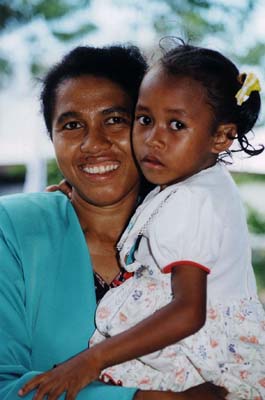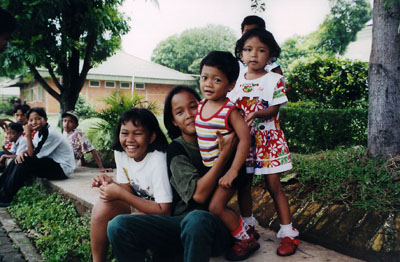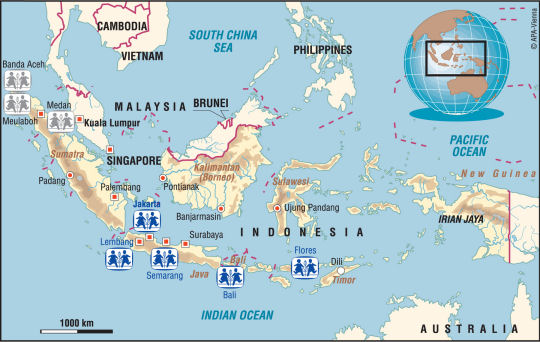SOS Children in Indonesia

Spread across an archipelago of thousands of islands between Asia and Australia, Indonesia has the world's largest Muslim population. Conflict and violence across the archipelago has harmed, traumatized and displaced children and women on a massive scale. The vast majority of Internally Displaced Persons (IDPs) are women and children and is estimated to be some 1.4 million. Indonesia's population grows by about 3 million each year and has high urban population growth, straining its cities capacity to provide housing and social services.
SOS Children began working in Indonesia in 1972 when the first village was built in Lembang, 16km north of Bandung on West Java. SOS Children's Village Lembang began with 13 family houses. It now has a kindergarten, a primary school for over 600 pupils, two vocational training centres providing courses in computer technology, carpentry and metalwork, a social centre and a medical centre. A youth house in Bandung provides accommodation for older children on the verge of independence and finishing their education or vocational training.
The charity built a community in Jakarta in 1984 in Cibubur, on the outskirts of the capital of Jakarta. It has 15 family houses and a youth house, as well as a nursery for 75 children, both from the village and the neighbourhood. The older children attend private or state elementary and secondary schools. At the centre of the village is a 'pendopo', a traditional Indonesian assembly hall, which is used for meetings, parties, dancing and even sports events.

Semarang was the site for the next charity village in 1984, in the capital of Central Java, on the north coast of the island. The village has 14 family homes and a youth house for the older boys, as well as a nursery for up to 75 children. In one corner of the village there are a number of ponds which supply the village with fresh fish, and each SOS family has its own vegetable patch. Some of the youngsters also run a small chicken farm.
SOS Children Bali is situated on the main road from Java to the Balinese capital of Denpasar and has 12 family homes. A large orchard provides the village with fresh fruit, and two small ponds supply fresh fish. Children are brought up following Balinese cultural traditions. Sport is very popular at this village and the girls' volleyball team has been very successful. The SOS nursery provides pre-school education for 75 children from the village and the surrounding neighbourhood, and there are three youth houses in Denpasar for adolescents taking their first steps towards independence.
The charity decided to build a village on the island of Flores was taken after the devastating earthquake in December 1992. SOS Children Flores opened in 1995 in the village of Waturia, 14km west of the district capital of Maumere.
As the island is frequently struck by earthquakes, the village buildings have special earthquake-proof roof constructions and the floors have been raised to provide protection in the event of a tsunami. There are twelve family houses and a youth house for the older boys. Vegetable gardens have been laid out for each house to provide the families with fresh vegetables and fruit trees were also planted. In 1997 the SOS nursery was opened for children from the village and the neighbourhood.
In 1999, heavy fighting in East Timor between government troops and independence fighters led SOS Children to establish an emergency relief programme, providing shelter at the SOS Children's Village Flores for a group of 130 children from an orphanage in Dili, the capital of East Timor capital. The children stayed in the charity's care for the duration of the war.
SOS Children and the Boxing Day tsunami
On the morning of 26 December 2004, a tsunami, caused by an earthquake off the coast of Indonesia, struck the coastal areas of the Indian Ocean. More than 130,000 people died in Indonesia, and even more lost their homes and thousands of children were separated from their parents. The 200km coastline between the cities of Banda Aceh and Meulaboh was the worst affected area and many families fled the peninsula to seek refuge in neary Medan.
SOS Children was one of the first NGOs offering support to the survivors in Aceh province after the tsunami struck and continues to provide long-term assistance in the area. Many children lost their families and the loss of homes, infrastructure and belongings continues to affect communities.
SOS Children continues to provide communities with the support needed to regain their livelihoods and is currently constructing three new SOS Children's Villages. The villages are located in Meulaboh, Medan and Banda Aceh, and will provide up to 450 children with a new family home. Also under construction are three nursery schools, where children from the new villages and the local community will receive a basic education, and two mosques, to enable the continuation of traditional cultural and spiritual practices.
Country Map

Local contacts
SOS Desa Taruna Indonesia
JI. Sari Endah 9
Gegerkalong
Bandung 40152 / Indonesia
Tel +62/22/201 28 81
Fax +62/22/201 10 26
e-mail sosindo@bdg.centrin.net.id
Next Country: Kenya